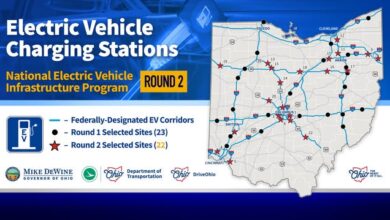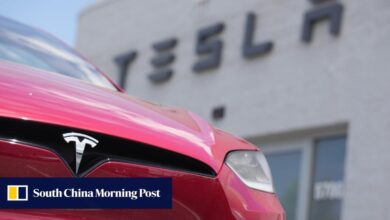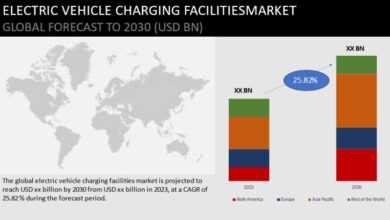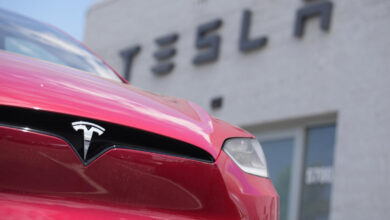Va. governor reverses state course on electric-car sales mandate
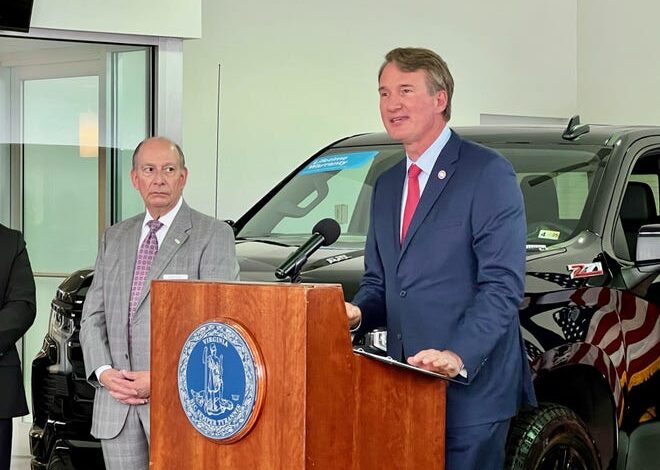
CHESTER – Saying he was “unleashing the power” of Virginia consumers, Gov. Glenn Youngkin said he planned to do away with a California-driven initiative requiring that a percentage of vehicle purchases in the state be electrically-powered cars by the end of the year.
“We are ending once and for all the California Electric Vehicle Mandate in Virginia,” Youngkin said to thunderous applause Wednesday afternoon in an appearance at Loyalty Toyota. “The idea that governments should be telling Virginians what kind of car they must drive is just simply wrong. The idea that unelected bureaucrats in California should be deciding for Virginians what car they drive is wrong. And finally, unleashing the power of the consumer to, in fact, drive what inventory is carried here and how they are serviced is what free enterprise is all about, and that’s what today represents.”
Youngkin’s order takes effect Dec. 31, 2024.
The announcement from Virginia’s Republican governor drew immediate and intense criticism from Virginia Democrats and the state’s energy-conservation lobby. They accused Youngkin of unilaterally trying to overturn a law that had been on the books since 2021 – the last year that Democrats controlled both the executive and legislative branches of Virginia’s government.
“We fought a war in 1776 to ensure that a governor doesn’t have these kinds of powers,” state Senate Majority Leader Scott Surovell, D-Fairfax County, told Richmond television station WRIC. “Governor Youngkin thinks he has more power than Vladimir Putin. He does not have the power to declare what the law is and what it isn’t.”
The Chesapeake Bay Foundation decried Youngkin’s decision as “removal of an important shield in the fight against climate change, environmental degradation, and rising health care costs.” The Virginia chapter of the Sierra Club said Youngkin “thinks he can sidestep the laws he doesn’t like,” and in a poke at the governor’s business background added that Virginia’s democratic processes “are not Governor Youngkin’s hedge fund.”
What does the decision do?
Three years ago, the General Assembly authorized the state’s Air Board to adopt the “Advanced Clean Cars-1” regulations, a set of rules adopted by California as part of the U.S. Clean Air Act. Those rules required that 22% of all new cars sold in Virginia in 2025 be powered by electricity, increasing to 35% in 2026.
In 2022, California adopted a second set of clean-air regulations that mandated 100% of new-car sales be electric by 2035. Those would supersede the original stipulations and go into effect Jan. 1, 2025.
By federal law, California is the only U.S. state that can set its own air-quality emission standards. Several states – including Virginia – adopted standards based on those in California.
What Youngkin’s order does is to eliminate Virginia’s standards based on California law and revert to federal standards prior to 2021. The governor said he based his order on an opinion from state Attorney General Jason Miyares that Virginia could withdraw because the standards passed in 2021 no longer applied to the second set of California regulations going into effect next year.
Not unexpected
Youngkin’s announcement came as no surprise as Virginia Republicans have railed against the California emissions mandate ever since its inception. With his attorney general’s opinion in hand, however, Youngkin said now was the time to unplug the mandate.
Virginians, he said, should live by rules and laws adopted by Virginia, not a state all the way across the country. “Abdicating them to California was really a bad idea to begin with,” he added.
“The idea that government should tell people what kind of car they can or can’t purchase is fundamentally wrong,” Youngkin told the crowd packed inside a service-reception area of the dealership. “Virginians deserve the freedom to choose which vehicles best fit the needs of their families and businesses.”
In Miyares’ opinion, he cited a difference between the meanings of “shall” and “may” regarding code enforcement. “Shall” indicates a mandatory alignment while “may” gives the state discretionary authority about enforcement. The 2021 regulations state that Virginia’s Air Board “may” adopt the California emission standards, and that, as Miyares reads the law, indicates Virginia is not bound to the California mandate.

Miyares, who joined Youngkin at the dealership appearance, defended his opinion, He said the 2025 Assembly session could consider legislation adapting Virginia again to California, “and they have that right under the democratic process.” In the interim, though, Youngkin’s order would stand.
Not against electric cars
Youngkin and Miyares were quick to note that neither was totally against electric cars in Virginia. Miyares said he has friends who drive such vehicles “and they love him.”
The bottom line, they both said, came down to Virginians’ vehicle preference, not the government’s. If the choice is electric, gas-powered or a hybrid, that is up to the consumers.
“It’s about the freedom to choose which type of car you want to drive,” Youngkin said
Dealers support the governor
The order was welcome news for the Virginia Automobile Dealers Association, which joined Youngkin and Miyares at Loyalty Toyota. A statement from VADA reiterated their stance that the choice of car should be left to the consumer.
“The reality, however, is that consumer demand for EVs in Virginia and nationally has not yet materialized, compounded by costs, ‘range anxiety’ and the lack of charging and electrical infrastructure to support these new vehicles,” the VADA statement read. “We continue to believe EV goals are achievable, but on a longer timeline.
“We respectfully have come to the point where we believe Virginia should uncouple itself from these standards at this time.”
‘In the dust on the road to nowhere’
Virginia’s conservation lobby lobbed pointed criticism of the Youngkin decision. The Virginia League of Conservation Voters said the decision means that the governor “wants Virginians to keep breathing tailpipe pollution” regardless of what Virginia law states.
“By continuing to stand in the way of climate progress, Youngkin is jeopardizing our health and our economy,” VLCV executive director Michael Town said in a statement. “The transition to a cleaner transportation future is well under way, with most major car manufacturers responding to consumer demand with plans to transition most or all of their fleet to clean cars in the coming years. In the face of a massive economic opportunity, Youngkin is fine with Virginia being left in the dust on the road to nowhere.”
The Chesapeake Bay Foundation called Virginia “a leader in the fight against transportation emissions that damage Virginians’ health, pollute critical waterways, and contribute to climate change.” A CPF statement said Youngkin’s decision was based on an opinion that “misinterprets the law and undermines the clear intent” of the state legislature’s commitment to healthy air.
“Governor Youngkin’s decision sends the state in the wrong direction when it has never been more urgent to address this major driver of environmental and health problems in the commonwealth,” CBF staff attorney Patrick Fanning said in the statement.
Bill Atkinson (he/him/his) is an award-winning journalist who covers breaking news, government and politics. Reach him at batkinson@progress-index.com or on X (formerly known as Twitter) at @BAtkinson_PI.
